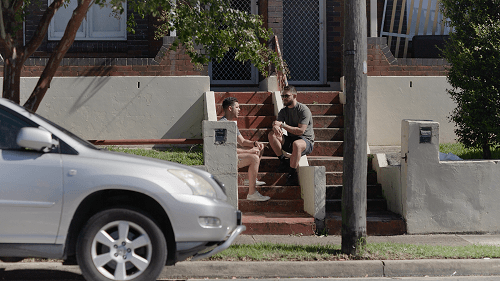10 Nov 2022
How to talk to someone about their anger
5 minutes read time.
Dr. David H. Demmer, Senior Clinical Psychologist
Key Points
Anger is a normal human emotion, but it becomes a problem when it leads to aggressive behavior.
There are several warning signs you can watch for that someone you love has a problem controlling their anger.
It’s important to know how to respond when someone is angry – and how to set appropriate boundaries for your own well-being.
Everyone gets angry. But have you ever wondered if your anger (or someone else’s) is something to worry about?
Anger is part of what it means to be human. It’s connected to your human survival instinct, also known as the ‘fight or flight’ impulse. (Anger is the ‘fight’ part.) Apart from helping you survive, anger can motivate you to fight injustice or speak up for what matters to you.
But there’s a big difference between anger and aggression. How can you tell one from the other? And what should you do if someone you know has recurring anger issues?

What is anger? And when is it a problem?
Anger is a normal emotional response when something turns out differently than how you wanted, or when someone harms you. It’s one of your body’s ways of telling you something’s wrong:
There’s an injustice
Someone is being treated unfairly
Something isn’t the way you expect it to be.
Left unchecked, however, anger can lead to aggression. This is one possible behavioral response to feeling angry. In practical terms, aggressive behavior can look like:
Hostility
Disrespect
Dismissing other people’s needs
Becoming domineering or even violent.
Aggression can also take more subtle forms, what we often refer to as passive-aggressive behavior. This is when we seek to punish the other person by indirect means such as sarcasm, exclusion, or sabotage for example.
Bottom line: we’re meant to feel angry sometimes. But you can feel angry without resorting to aggressive behavior.
Positive effects of anger
Anger has a number of benefits – in fact, it would be hard to survive without it:
Anger can trigger our defences when we’re threatened or in danger.
It can compel us to stand up for those being mistreated (including ourselves).
Anger is an important signal to others when something is wrong – when there’s something we need them to do (or stop doing).
Negative effects of anger
For all its useful purposes, anger can also be harmful, especially when it leads to aggressive behavior.
You can use your anger to get people to do what you want, like when a parent is aggressive towards a child for not following instructions. But the effect is usually short-lived – and harmful to the other person in the long run.
That’s because aggressive behavior damages relationships. It makes the other person feel unsafe. They may try to put distance between themselves and the aggressor, or avoid sharing how they really feel.
Four common expressions of anger
Assertive anger
This is where you’re able to express yourself in a constructive, measured way, without attacking or hurting the other person.
Aggressive anger
Unrestrained anger expressed by yelling, throwing or breaking things, making threats, or becoming physically or verbally hostile.
Passive-aggressive anger
Anger that seeks to “punish” the other person by indirect means such as sarcasm or sabotage.
Passive anger
Also be described as “avoidant anger,” this is when a person bottles up their anger (which can lead to bigger problems down the road).

How to tell if someone has an anger issue
Again, anger in itself is not the problem. It’s when it becomes more of a defining trait, or if it regularly leads to aggression. This kind of anger takes a devastating toll on relationships:
It can leave the other person feeling like they always have to walk on eggshells.
It can discourage people from sharing what they really think or feel, because they’re afraid of triggering their loved one’s anger.
At its worst, unchecked anger can put others at risk of harm.
Chronic anger is also bad for the person experiencing it. It has several negative physical effects, including:
Increased blood pressure.
Physical ailments like stomach pain, chest pain, heartburn or ulcers.
Increased risk of heart problems. (One study of 4,083 adults found those with the least control over their anger had the highest risk of heart disease.)
So how can you know if someone’s anger is a problem? It’s all about recognising the warning signs.
Spotting the difference between anger and aggression
If someone you know has a hard time controlling their anger, ask yourself the following questions. If you find yourself answering yes to a lot of these, there may be a problem.
Is their anger triggered by minor annoyances?
Do they go straight from “0” to “10” on the anger scale?
Do they pick fights for no clear reason?
Do they stay angry for long periods of time?
Are they abusing alcohol or other substances?
Have they expressed a desire to inflict harm or exact revenge?
Do they have outbursts like slamming doors, throwing things, or punching walls?
Have they ever damaged someone else’s possessions while angry?
Have they ever threatened to harm you or someone else?
Do they become verbally or physically aggressive?
Important: Under no circumstances should you tolerate verbal or physical aggression from a partner, loved one or friend. If this happens, try to remove yourself from the situation as safely and quickly as possible. If you’re worried someone you love might become violent, have a safety plan in place ahead of time, including who to contact for help. (More on that below.)

What to do if someone is angry at you
No one likes being on the receiving end of someone’s anger, even if it’s expressed in a healthy way. But it’s something all of us experience. What should you do when someone is upset with you?
Stay calm. Try not to match their anger. Doing so may escalate things.
Cut yourself some slack. Remember: it’s not your job to “fix” their anger.
Give each other space. If they’re mad and your defensive, it may not be the best time to work things out. Take some time to cool down before discussing things.
Try listening (without reacting). Often we’re angry because we feel misunderstood or unheard. Try repeating back to the other person what you think they’re saying. This can go a long way to helping them feel validated.
Know where to flex and where to stand firm. See if there are any changes you can make, but also know when to respectfully stand your ground. Try to understand what’s triggering the other person’s anger, so you can address the issue together. Just remember: understanding is a two-way street. They need to consider your feelings too.
Most of all, set healthy boundaries to protect your physical and emotional safety. Anger is never an excuse for being verbally or physically aggressive. Make sure you know how to recognize aggressive behavior so you can remove yourself from the situation if necessary.
Examples of verbal aggression include:
Shouting
Sweeping accusations
Insults or degrading language.
Physical aggression is more than just when one person strikes another. It can also include:
Slamming doors
Throwing objects
Punching walls
Intruding on your personal space
Blocking your path.
What to do if someone’s anger or aggression is becoming a problem
Have a safety plan
Make a list of trusted friends or family members to contact if you need help, as well as local emergency services. If it’s your partner or spouse with the anger problem, make sure you have a neighbor or friend you can turn to – or at the very least, another place you can go – if your safety is a concern.
Pick the right time and place to talk about it
Namely, choose a time when they are calm. Don’t bring it up when they’re already angry. Consider going to a public place to talk, like a park or coffee shop, where they may be less likely to lose control of their anger.
Let them know how their anger makes you feel
Use “I” statements to express how you feel and how you want to be treated. Avoid making generalizing or accusatory statements.
- Instead of: Why are you so angry all the time?
- Try this: When you raise your voice at me, I feel unsafe.
Encourage them to seek help
Sure, anger management therapy is widely mocked in popular culture (remember Andy Bernard from The Office?). But it works. Dozens of studies have shown its effectiveness, especially when more than one technique is used to help someone deal with their anger. Different therapies for anger can include:
- Cognitive behaviour therapy (CBT) to identify what triggers a person’s anger and practice healthy coping methods.
- Cognitive restructuring techniques to help someone identify the biases, beliefs and assumptions that lead to anger.
- Family therapy if a loved one is directing their anger at their partner or children.
- Relaxation techniques such as breathing exercises, mindfulness and muscle relaxation.
What if they deny there’s a problem or refuse to do something about their anger? Remember, you can’t force someone else to change. Remind them that you’re here for them if and when they’re ready to get help.
It’s also important to know when to walk away. Don’t stay in a relationship with someone if your safety is jeopardized by their anger.
Anger is a natural human emotion. Knowing the difference between anger and aggression is important – so we can stay aware of how we treat others when we’re feeling angry, and how we’re being treated by someone who’s angry with us.
Nothing really makes sense anymore.
Seems like it's really getting to you. Have you talked to anyone else about all this?
